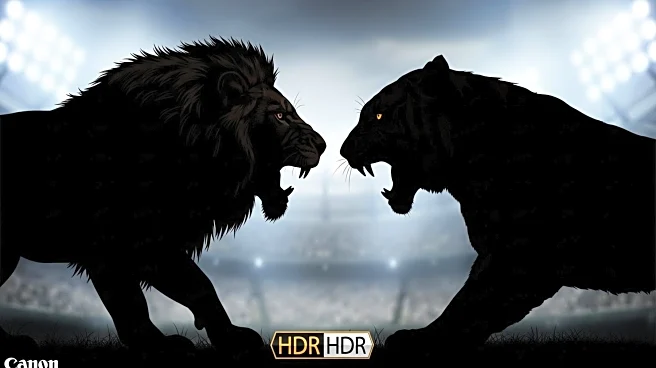What's Happening?
A postgame altercation erupted following the Kansas City Chiefs' victory over the Detroit Lions. Chiefs quarterback Patrick Mahomes approached Lions defensive back Brian Branch for a handshake, which Branch declined. This led to an exchange of words between Branch and Chiefs wide receiver JuJu Smith-Schuster. The situation escalated when Branch shoved Smith-Schuster, who fell to one knee. Despite efforts by Chiefs running back Isiah Pacheco to restrain Branch, the Lions player managed to remove Smith-Schuster's helmet. The incident involved players from both teams attempting to separate the two, with additional punches thrown before the skirmish ended. The Chiefs secured a 30-17 win, improving their record to 3-3, while the Lions fell to 4-2.
Why It's Important?
The altercation highlights tensions in the NFL, particularly in high-stakes games. Such incidents can lead to disciplinary actions from the league, affecting team dynamics and player reputations. The Chiefs' victory was crucial for their season recovery, while the Lions' loss ended their streak of scoring 30 points in consecutive games. The brawl may result in suspensions or fines, impacting team performance and player availability in upcoming matches. This event underscores the importance of sportsmanship and the potential consequences of on-field conflicts.
What's Next?
The NFL is expected to review the incident and possibly issue penalties to involved players. This could include fines or suspensions, affecting team strategies and player participation in future games. Both teams will need to address the fallout internally, focusing on maintaining discipline and sportsmanship. The Chiefs will aim to build on their victory, while the Lions will seek to rebound from their loss. The league's response may set a precedent for handling similar situations in the future.
Beyond the Headlines
The brawl raises questions about the culture of aggression in professional sports and the role of sportsmanship. It may prompt discussions on how teams can better manage player conduct and emotions during high-pressure situations. The incident could lead to increased scrutiny on player interactions and the enforcement of conduct rules by the NFL. Long-term, this may influence how teams train players in conflict resolution and sportsmanship.











